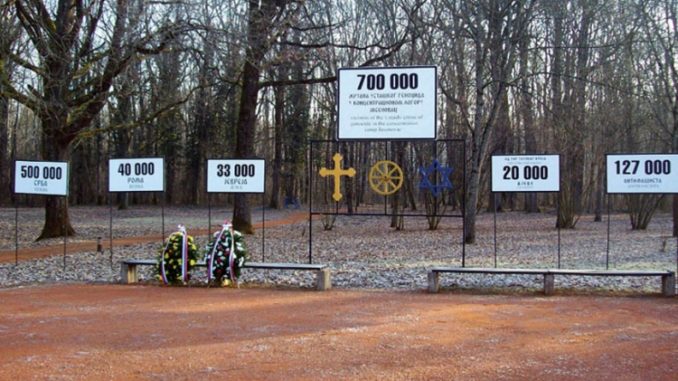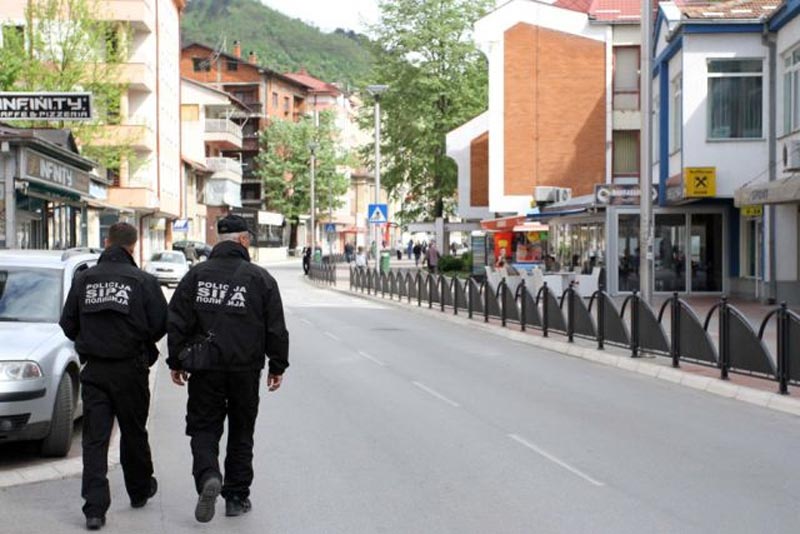
The Russian Ambassador to BiH, Alexander Botsan-Kharchenko, said today that the commemoration being held in Donja Gradina is of exceptional importance in terms of responsibility towards past and future generations and civilisation.
“Every person here must find a clear and final answer to the question of what evil is, what good is and what crime is, and what the values of civilisation and human values are,” Botsan-Kharchenko said at the commemoration for the victims of the Croatian Ustashe genocide committed in the Jasenovac Concentration Camp.
He stressed that the dual interpretation of the values of civilisation in fact is the betrayal of those who died for such values, including the 700,000 people killed in the worst possible way in Jasenovac.
The Ambassador warned that even today we have manifestations of neo-Fascism, national hatred and glorification of monstrous criminals through expressions of supposed democracy.
“Our common memory will prevent these manifestations and ensure the right of every people to live free,” concluded Botsan-Kharchenko.
Addressing the commemorative gathering, the chairman of the Israeli local administration organisations, Haim Bivas, recollected that 69 years have elapsed since the end of WWII and the killing of innocent Serbs, Jews and Roma with the view to their extermination.
“Even though so much time has elapsed, the magnitude of the Holocaust remains outside the bounds of comprehension, too terrible to consider and face,” said Bivas, who is Mayor of the City of Modin, Israel.
He added that he is proud of the inheritance of his ancestors and of the existence of the state of Israel, and stressed that the Jewish and Serbian peoples are tied by a common fate, one which demanded much suffering.
“Like the existence of the state of Israel, the existence of a stable and democratic Republika Srpska represents a guarantee that such terrible crimes shall not be repeated in the region,” Bivas said.
He called on all present to continue studying the Holocaust for thus do we remember and build ourselves and our future through such remembrance.
Numerous delegations and individuals laid wreaths at the Topole killing ground on the occasion of the Ustashe Victims Remembrance Day in memory of the Croatian Ustashe genocide committed in the Jasenovac Concentration Camp and its principal killing ground, Donja Gradina.
A memorial service was said today at the “Oaks” killing ground in the Donja Gradina Memorial Area for victims of the Ustashe genocide committed in the Jasenovac Concentration Camp and its principal killing ground, Donja Gradina.
A prayer for Orthodox victims of the Ustashe crime was said by His Eminence the Bishop of Banjaluka, Jefrem, a prayer in Yiddish, the Kaddish, was said by Rabbi Isac Asiel, and a prayer for all Roma killed was said by the president of the World Roma Parliament, Dragoljub Ackovic.
Dodik: People who lose their memory lose identity
Republika Srpska President Milorad Dodik said today at a commemoration for victims of the Croatian Ustashe genocide committed in the Jasenovac Concentration Camp and its principal killing ground, Donja Gradina, that the remembrance of what happened in this place must be preserved, as people who lose their memory lose their identity.
In his address to those present at the commemoration, Dodik said that it will never be clear why the authorities kept silent about the victims in Jasenovac and that the authorities of the former Yugoslavia hid or did not want to present the truth about these crimes, trying to escape determining even the number of victims, turning them symbolically into a flower of stone.
“Yugoslavia was a great historical, political, national and civilisational delusion of the Serbian people, who by creating Yugoslavia lost a significant portion of its population and integrity,” Dodik said and added that even today the Serbian people are prevented from speaking of a common life, and that their contribution to the anti-Fascist struggle is belittled.
According to him, it happened on a number of occasions in history that the Serbian victims were belittled, and Serbs persistently believed that coexistence was possible with people who were doing this.
Dodik said that today, everyone can live peacefully in Srpska regardless of their faith, ethnicity or colour of skin, but they must respect its institutions and the Serbian people’s memories which are full of pain.
“Republika Srpska is the expression of the will of the Serbian people in these parts, people who in past times lived in delusion, who created the former Yugoslavia and the motto of ‘brotherhood and unity’ in mixed communities,” Dodik said.
Dodik said that the crimes which were committed in Jasenovac and Donja Gradina were unknown by that time, and that even today it is incomprehensible that some had so great an urge to constantly and cruelly kill for years on end.
He said that it must not happen that young generations should come of age without knowing what happened in Jasenovac and of the way how the former Yugoslavia was created, how it was destroyed and who was the victim in it.
“We are not doing this to hate anyone or to pursue justice, but in order to be able to defend our identity in this area,” Dodik said.
Dodik told reporters that generations of descendents must go on, build Republika Srpska, as it was the old desire of many sufferers who have never given up on their people.
Radojicic: Do not forget victims
The Speaker of the Republika Srpska Parliament, Igor Radojicic, said at Donja Gradina today that unfortunately, there is an historical continuity in the suffering of the Serbian people in these parts from generation to generation.
“Today we observe the [Ustashe Victims Remembrance] Day in memory of victims from a very dark and difficult period of our history, and events which we can only with difficulty comprehend, and the worst thing that can happen today is that we forget,” Radojicic told reporters after today’s commemoration at the Donja Gradina Memorial area.
He said that every generation in these parts has faced war, and recollected other of the terrible sufferings of the Serbian people of past centuries in the Krajina and BiH during the Turkish Ottoman occupation and the WWI.
“This year we mark one century since Gavrilo Princip assassinated [Franz Ferdinand] and lit the match of suffering in WWI, when many were deported to concentration camps in the then Austro-Hungary,” Radojicic said.
He said that when the generation which had survived WWI had come of age, WWII came along and the sufferings in Jasenovac, followed by the 1991-1995 war.
He said that it is the obligation of our generation to do everything to see that such things are never again repeated.



